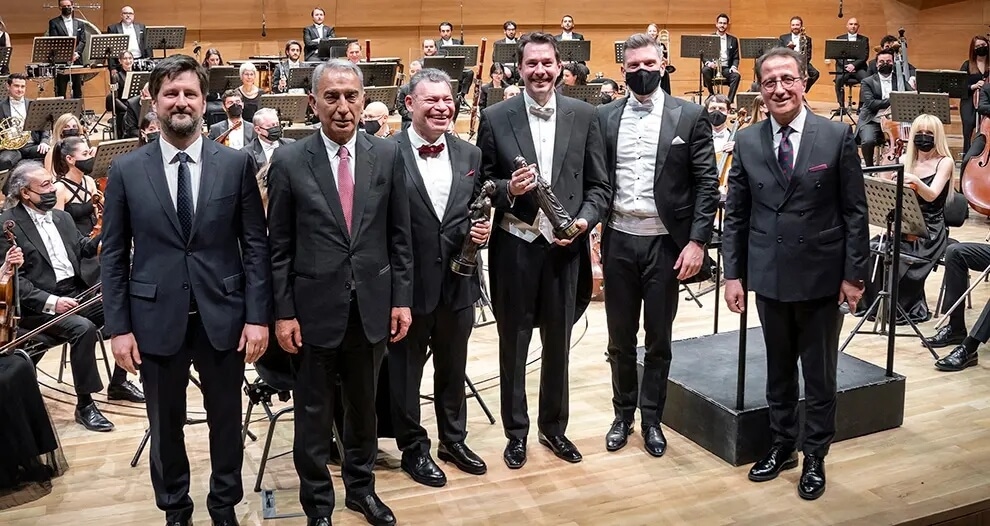Make a call...

“Gül Baba Symphonic Poetry” will meet the audience for the first time at CSO Ada Ankara on Friday, April 1, through the Presidential Symphony Orchestra, one of the oldest orchestras in the world.
Famous orchestra conductor Heja Domonkos and pianist Jozsef Balog will take place as guests from Hungary at the concert.
The Gül Baba Tomb Heritage Preservation Foundation, established with the aim of building a bridge between the Turkish and Hungarian communities and enhancing cultural, economic, and touristic relations and activities between the two countries, is making its debut with a special symphonic poem for the first time.
Gül Baba Heritage Preservation Foundation embraces the mission of contributing to the history, culture and social life of the two nations by making Gül Baba Tomb, one of the most permanent symbols of Turkey and Hungary, a living culture and art venue. The first step of the activities in Turkey is taken with the concert of "Gül Baba Symphonic Poetry", which will meet with the audience for the first time through the Presidential Symphony Orchestra and will have its world premiere. It is aimed to further deepen and make sustainable the existing bond between the two countries through cultural, artistic and academic activities to be continued in the future. “Gül Baba Symphonic Poetry” will be released in Turkey on April 1 and will take the stage in Hungary soon. It will also meet with world-renowned conductors and orchestras.
Speaking about this special event, Adnan Polat, Chairman of the Board of Trustees of the Gul Baba Tomb Heritage Preservation Foundation, said: “Turkey and Hungary are two friendly countries with deep-rooted historical and cultural ties that have never been severed over the centuries. They have maintained long-standing economic, political, commercial, touristic, and socio-cultural relations. Both countries reflect the traces of their shared heritage through significant historical monuments that embody their strong common bonds. The Gül Baba Tomb, with its legacy and the most comprehensive restoration work to date, stands as a symbol of friendship between Turkey and Hungary and as a crucial element that supports cultural and commercial cooperation. By crowning this collaboration with the "Gül Baba Symphonic Poem," we aim to ensure that this spiritual heritage reaches more people worldwide through renowned conductors and orchestras, strengthening this meaningful cultural connection even further, not only between Turkey and Hungary but also globally.”
About Gul Baba Tomb Heritage Preservation Foundation: The Gul Baba Tomb Heritage Preservation Foundation was established by the Hungarian State in 2017 with the aim of preserving, operating and carrying the unique cultural values to the future, as well as the Gül Baba Tomb and its surroundings. The aim of the foundation is to introduce the Tomb and the surrounding complex to as many people as possible by building a cultural bridge between the two countries. Efforts are underway to turn this beautiful environment into a lively cultural center.
The mission of the Gül Baba Tomb Heritage Preservation Foundation is to protect and promote Hungarian-Turkish friendship and to showcase Gül Baba's physical and spiritual heritage. With the cultural activities carried out, the two nations have the opportunity to get to know each other's culture and values, and thus to establish a closer friendship between the two countries.
The vision of the foundation is to deepen the friendship between the two nations by revealing the similarities between Hungarian and Turkish culture in the fields of gastronomy, language, traditional folk costumes and music.
Gül Baba’s story: Gül Baba, whose real name is Cafer, is known as a Bektashi dervish belonging to the Veli Baba Lodge. The Ottoman Emperor Suleiman the Magnificent always stood by the Hungarians in the 1500s when Mohaç, Zigetvar, and Budin were upset by the Roman-Germanic harassment and brought Gül Baba with him on his last visit. Gül Baba stayed in Budin for ten years between 1531 and 1541 by the order of Suleiman the Magnificent, devoting himself to reinforcing the brotherhood, tolerance and friendship of the peoples between the two countries. With a wooden sword in his hand and a yellow and red rose on his head, he was always called Gül Baba, and spent the last years of his life, which exceeded a hundred years, in Budin. Suleiman the Magnificent also attended the funeral prayer of Gül Baba, who was martyred in the Battle of Budin in 1541, and was led by Şeyhülislam Ebussuud Efendi and it is rumored that 200 thousand people attended. Gül Baba is buried on a hill in Budapest, overlooking the Danube and Pest, with a beautiful view. This place was named 'Gültepe' and the tomb where it is located was built between 1543 and 1548.
Gül Baba Tomb has gone through various changes and periods over the centuries. The tomb and the cherished memory of Gül Baba have been preserved for centuries as a symbol of Turkish-Hungarian friendship. Gul Baba Tomb, which was registered as a historical monument in 1914, has been open to visitors as a museum since 1962.





